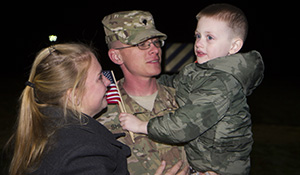
AAAA Family Forum / Judy Konitzer: I may be “preaching to the choir” as I expound on some expectations that military families have when coming together again after a long deployment, however research and accompanying data have made observations and suggestions that have proved timely and valuable.
 A Soldier from Company E, 3rd Combat Aviation Brigade, is reunited with his family in time for the holidays at a ceremony at Cottrell Field on Fort Stewart, GA, Dec. 19.A few months ago I also requested some help from the field to share the highs and lows of enduring repeated deployments, but garnered limited responses. My thought was our seasoned servicemember spouses could write the book on how-tos. Hopefully, this will elicit a response from many and in a future article we can share the positives and negatives of how to “survive” the deployments from our Aviation community families. In the meantime, I will just share a few facts for those new to the service that hopefully will prove valuable.
A Soldier from Company E, 3rd Combat Aviation Brigade, is reunited with his family in time for the holidays at a ceremony at Cottrell Field on Fort Stewart, GA, Dec. 19.A few months ago I also requested some help from the field to share the highs and lows of enduring repeated deployments, but garnered limited responses. My thought was our seasoned servicemember spouses could write the book on how-tos. Hopefully, this will elicit a response from many and in a future article we can share the positives and negatives of how to “survive” the deployments from our Aviation community families. In the meantime, I will just share a few facts for those new to the service that hopefully will prove valuable.
Understanding the Returning Family Member
Military deployments, especially in a combat zone, can significantly change an individual’s life. What is taken for granted in a home setting but then transferred to a war zone involves loss of personal contact with family, uncomfortable living conditions, no time for relaxing, sometimes lack of a variety of favorite foods, not to mention hard work and enormous responsibility and the constant threat of loss of life or injury. Upon returning home, servicemembers may have suffered physical or emotional injuries or worse yet a disability. They can also seem preoccupied with the experience of their deployment, and yet may also expect extra attention and support for some time after their return.
Understanding the Adult that Stayed at Home
At the same time, life has gone on at home and the spouse and other family members have had to take over functions that were normally performed by the deployed family member. Some problems that were handled could be a big surprise. And the stay at home adult may expect extra attention and credit for what they did. They might even expect their Soldier to automatically accept the family as it now exists, which could prove to be uncomfortable.
Understanding the Children
Children’s responses are influenced by their developmental level and it is important that if children seem anxious or uncertain about the reunion, it should not be misinterpreted or taken personally. Toddlers may be shy; school age children may not understand the returning parent’s need to take care of themselves and spending time with their spouse; and teenagers can seem distant as they continue activities with their friends.
Understanding the Family
Couples may find that deployment has strained their relationship, and problems that existed before the deployment frequently reappear after the return when “absence made the heart grow fonder.” For those who have chosen to return to their “home” communities and thereby received support and service from members of their extended family such as grandparents, aunts and uncles, it may prove difficult to redefine this role once the deployed servicemember returns and perhaps relocates the family to another location.
Give Everyone Time
Every family situation is different and every family member will have different expectations and most families will have changed. And all family members regardless of age, sex, rank or time in service, number of deployments, education levels, spousal employment, number of children, as well as extended family and friends will need time to adjust to the changes that accompany the return of a deployed family member. The goal is to form a healthy new life together, and we are very fortunate that a myriad of resources have been generated both within the military as well as throughout our civilian communities to help families successfully reunite with a minimum of problems. And if problems should arise, the stigma of seeking help from a qualified mental health professional is becoming a thing of the past.
Those of us who were part of the Vietnam era did not have the benefits of today’s research and shared knowledge about expectations and what is the “new normal.” How good it would have been to know that what we were experiencing after deployment, good and bad, was something we could share. Knowledge is so important in building resiliency, and by sharing our stories we can help to meet the challenges of our lives as we continue to embrace our pride in belonging to the Army Aviation family.
Judy Konitzer is the family forum editor for ARMY AVIATION; questions and suggestions can be directed to her at This email address is being protected from spambots. You need JavaScript enabled to view it..”>This email address is being protected from spambots. You need JavaScript enabled to view it..










